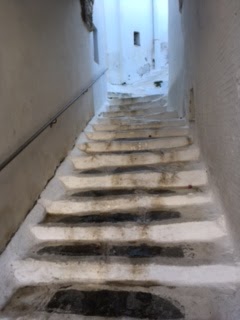Yesterday was that day. Here's what happened:
- For the last five years we've carried an umbrella liability policy. I figured if we had a business issue we'd be covered. Yesterday I read the policy and then called the insurance company. Turns out, nope, the policy would cover us if we were sued under our homeowner or auto policy for more than the policy limits. But not for a business interest. "You're on your own, honey," I said to myself.
- I owe the Bank of America $1.50 in interest charges. We had a credit card bill arrive while we were in Greece. The bill was for $11.30. Before we got home, we missed the cycle. When the new bill came I owed $11.30 plus $1.50. I paid it. Then the new bill came. I still owed $1.50! I called the bank and, after making numerous selections on the automatic line, finally chose, "Yes, I want a one-time courtesy reversal of the interest I owe." How convenient! I must not be the only person who's gotten on that merry-go-round.
- My husband Art told me he'd called to check on his massage appointment and had been told he didn't have one. We both have weekly appointments. His had been cancelled for today and all the others, through November, had been cancelled also. I called about my appointment. No appointment, for today or any time in the future. Someone had a field day with the delete button, apparently. I had been looking forward to that time on a table in a peaceful room. I was annoyed but there was no one to shout at. Besides, I am not a shouter.
- I am the treasurer for a nonprofit company that grew tenfold last year, so we can no longer file a postcard with the IRS. Instead, we have to fill out a longish form with numbers I have no idea about, since I was not the treasurer last year. We hired a CPA to do the tax work for 2016. The return is due on October 15. Three weeks ago I sent an email to the other principals asking for the information I needed to send to the CPA. No response from anyone. Yesterday, I sent another email. This time I sort of yelled. I don't yell very often either. I got a response, but I had unkind thoughts about the quality of other people's helpfulness.
- I failed my optometrist's vision test. I've had two cataract surgeries in the last five years and I haven't been wearing glasses to drive. I was fine without the cataracts. Yesterday when i took the test, the top line of letters on the chart looked like Chinese and the other lines were blurs. Turns out my distance vision is quite bad. Who knew? So now, in addition to an office prescription (computer and reading) and readers (reading only), I have to buy distance glasses. I went to Costco and paid $379 for the glasses.
- My iPhone battery died when we were in Greece. I have a second phone I used there, waiting until I got home to replace the battery. The same iPhone has a crack across the screen. I took the phone to the Apple store for a new battery, which costs about $80. The guy told me that when the tech person opened the phone to replace the battery, the crack on the screen would get worse. He suggested an upgrade; I could replace my iPhone 6 for ONLY $299, since the model been discontinued. I decided to put it in a drawer and use my other phone.
- I had a slightly heated discussion with one of my grown children for the first time in several years. He and his girlfriend had come to Seattle for the weekend. I saw them for ten minutes. His version of the story was that he tried several times to get in touch with me to come over for a longer visit. My version is that I held several parts of my weekend open to see him and he didn't make it over any of those times. The truth is somewhere in the middle, I guess. I managed not to say several things my own mother would have said to me. But barely.
- I had a spat with my husband about the remote. We were watching the Seahawks game. He changed the channel and all of a sudden the players on the screen were wearing different uniforms. I said, "Why did you change the channel?" "It's halftime. What's it to you?" I said, "There are two of us sitting here and you don't check with me. You just change the channel." He said, "You always want to be in charge." The conversation went downhill from there.
As I look at this list, I realize I may be cranky. That doesn't happen very often. None of the issues in the list are a major deal. But there are more issues than usual. I suspect it's because since I got home from Greece two weeks ago, I've been quieter than usual. When I was working in the refugee camp I was in near-constant conversations, with very little down time. Now I am taking that time. And the world is interrupting me.
Breathe in, breathe out. Be grateful. That's what I'm telling myself.






